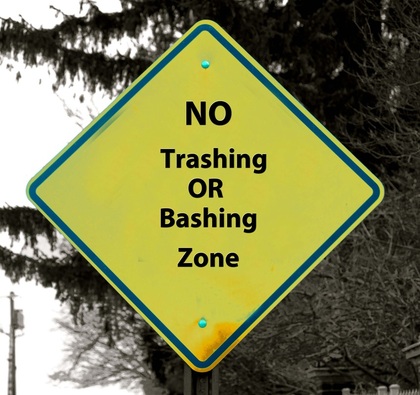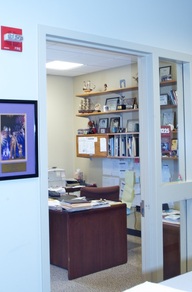I began to notice it while working out in the hotel gym. A woman next to me was high-stepping on an elliptical machine and at the same time trashing and bashing her colleagues to someone on her cell phone. At first I was annoyed at the incessant talking – then I began to notice the tone and content. “She’s nothing but trouble. I’m so tired of her expressing her opinions.” After 30 minutes of this continuous trashing I wanted to start singing “Jingle Bells” as loudly as I could in hopes that she would get the point and quit her conversation. After 40 minutes, I simply gave up and left. Had my Mom been there, she would have put her hand up, motioned to the women to stop, and reminded her, “If you can’t say something nice, then don’t say anything at all.”
The next morning while waiting for my 6 am flight I was sitting a few seats away from two copy machine salesmen who were trashing and bashing a customer for wanting too much information and not being able to make up his mind. I could not wait to get on the plane and escape this early morning negative stuff. I’m addicted to caffeine in the morning, but these guys seemed to need a good dose of negativity to get them going.
At that point I thought I had escaped the negative white noise. After being upgraded to first class I had visions of reading for a few moments and then retreating into my introverted space until I arrived at my next stop. That bubble burst when two gentlemen behind me felt the need to discuss their perfections and the imperfections and inferiority of their boss and company. I couldn’t help but wonder where my Mom was then.
I won’t continue this saga, but I will let you know that it followed me all the way home, which caused me to reflect. Am I this negative and just don’t notice it? Do I live by Mom’s words? Why do we dwell and focus on negativity, weaknesses and mistakes? Are we even conscious of this focus or has it simply become human nature? And there was one more question that really bothered me: have we lost all boundaries of what should be public and private discourse as well as a sense of place and time for these discussions? Has reality TV, YouTube and social networking so blurred the lines of what is personal and professional and private and public that we now accept and treat public space as a stage on which to share how much better we are than all those other people with whom we live and work?
It occurred to me that American businesses must be suffering through a crisis of incompetence. If all the people being bashed are as inept as their antagonists claimed, our economy is surely in for another shock.
I sensed that the people who were trashing and bashing got a boost of self-esteem from it yet were oblivious to the implications their behavior made about their own character and trustworthiness. Maybe the need to belong is so overwhelming these days that most of us would rather make disparaging remarks about others than take a stand and be heroic and positive. Frankly, we see this in bullying. In most bullying situations you have a “bully,” a victim, and the bully’s cohorts who stand by allowing the trashing and bashing but not actively participating, giving the perception of passive support. The fear of being ostracized has seemingly replaced our primal fear of Saber Tooth Tigers out looking to make a snack of us.
A common theme that ran through all of the conversations was self-interest and self-promotion. Had the salesmen taken the time to understand why their client was reluctant to buy their product, they might have had a more fruitful and hopeful meeting. If the woman on the elliptical trainer could step out of her fear of not belonging and frame the other woman’s behavior as being concerned, curious and wanting clarity, she might have an appreciation for her rather than an annoyance with her. And if the two perfect beings unable to find one positive trait in their boss and organization could reflect on the fact that both were selected and still employed by these inferior beings, they might, just might, find a way to be thankful and contribute to finding solutions to their complaints.
One reason for these actions, based on human behavior and biology, jumps out at me: stress. There’s little doubt that the past decade has been stressful and the current economic and political climate continues to foment increasing high levels of stress and create we vs. they worldviews. By allowing ourselves to be overwhelmed with this stress, our natural focus is on survival. We may even picture ourselves on a metaphorical Survivor Island, so we plot, connive, lie, and trash and bash our way to being the survivor. What we lose in the process is exactly what we want and need: respect, belongingness, self-worth, and a network of friends and colleagues willing to stand by us and offer assistance.
The answer to putting a stop to and reversing this destructive behavior could be as simple as my Mom says: “If you can’t say something nice, then don’t say anything at all.” I don’t mean to make light of this, because it does concern me and it should concern you for no other reason than the realization that the probability that someone is at this moment trashing and bashing you and your organization is greater than you think.
Trashing and bashing behavior is a cancer for teams and organizational performance and although our reptile brain says, “Attach or be eaten,” our chances for survival are actually increased by our ability and willingness to care for one other.
There are tools and concepts to help individuals and organizations learn how to stop and reverse this negative approach that is taking over and begin to reap the benefits of caring, focusing on strengths and transforming perceived weaknesses and problems into solutions:
- Positive Psychology
- Emotional Intelligence
- Resiliency
- Appreciative inquiry
- Authentic and Generative Leadership
- Generative Foundations of Actions in Organizations and the
- Strengths based work of Marcus Buckingham and others
To break the habit of trashing and bashing is hard work. The easy path is to find fault and focus on weaknesses instead of courageously finding the strengths in people and the opportunity and potential in difficult situations. It’s easy to jump on the negative bandwagon. But be careful – from what I see, it is already full. Take a different path and resist veering off into the negative – take a few moments and ask yourself, “Is this what I want and how I want to be seen and remembered?” Could you rest in peace with an epitaph that read, “Always ready with a disparaging word and never missed an opportunity to trash and bash even his best friends”?
None of us want to be seen or remembered for this destructive and bullying behavior. And it’s time for us to make a commitment to not participate in it actively of passively in either our personal or professional lives. There are many options that we can employ and they all begin with a decision to take a stand. In the end, you will appreciate yourself more for it and find that you have less stress and that people will enjoy and benefit from having a relationship with you.


 RSS Feed
RSS Feed
